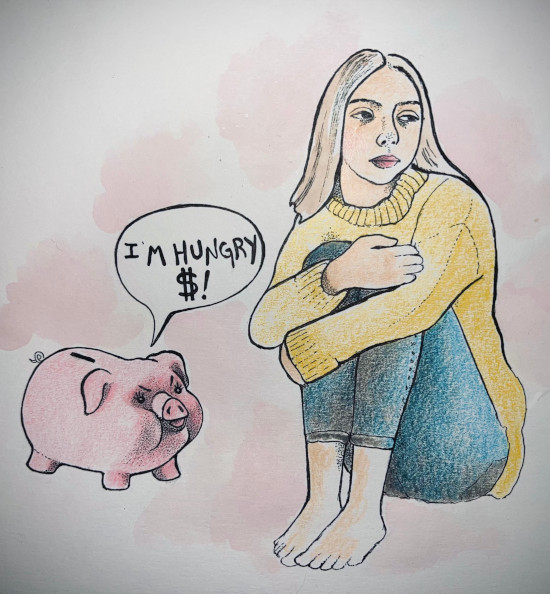Financial shame in a vibecession economy
XO, the financial therapist

Illustration by Gabrielle Funk
Money shame keeps me up at night, so I find myself going to the gym more, and more, and more. I hit the bag to stop thinking about the gnawing feeling in the pit of my gut. I spin furiously to squeeze every drop of anxiety out of my pores. I lift heavy to get strong enough to build a fortress around me. “This is good for my mental health,” I think.
I chat with the owner and coaches with the nonchalance of an aristocrat who lives the kind of life of leisure that allows her to take pilates during the workday. What they don’t know is I can barely afford my membership anymore. But I keep going aggressively, five, six times a week, convincing myself that if I go often enough, the expense is justified.
I get an email from the gym. They’re hiring. In exchange for a short shift once a week, I could receive a free membership. “Not for me,” I think. With this membership comes my self-worth, and letting go of the $165 per month expense would mean parting with my pride.
It’s difficult not to equate self-worth with income and spending habits. Not so long ago, I never felt that twinge of guilt under my sternum about money spent, because I was proud that I could afford small pleasures, that I earned them.
Today, things are different. I can’t stop feeling like I’m overspending when I look at receipts. When my credit-card bill hits, shame floods in. Am I this poor at managing money?
I look at prices and know things are more expensive than they were last year and the year before. But when I check on the status quo of the Canadian economy, I find out the country is not, in fact, in a recession.
In a June 2022 post on Substack, Kyla Scanlon coined the term “vibecession” to discern a general pessimism about the economy, regardless of whether it’s doing well.
Does that mean we’re all in this together? It doesn’t feel like it. I have friends who seem to be doing well. They have cars and homes and stable careers.
I begin to question more than my daily spending habits: was grad school a waste of money? I could’ve saved up to buy a house instead. Were those weekend trips really necessary? I could’ve used that money for clothes and groceries.
The shame spirals take over, and exercise is not enough to keep them at bay. So the next time I receive a “We’re hiring!” email from the gym, I reply immediately to convey my interest and availability.
To my own surprise, I like the work. I like being more involved in a place that gives me joy and a sense of community. With it, the shame is gone. Instead, I feel proud knowing I’m doing something to alleviate my credit-card bill. And I’m doing this by working a meagre three hours a week, not by cutting out a small pleasure from my life.
More than anything, I feel relieved. Holding onto my pride took a lot of energy. There’s no shame in making changes to our spending habits in a vibecession economy. It’s not a personal failure.
Elena Sturk-Lussier is a filmmaker with an MSc in creative writing and a penchant for romance novels.
Published in Volume 78, Number 15 of The Uniter (January 25, 2024)






